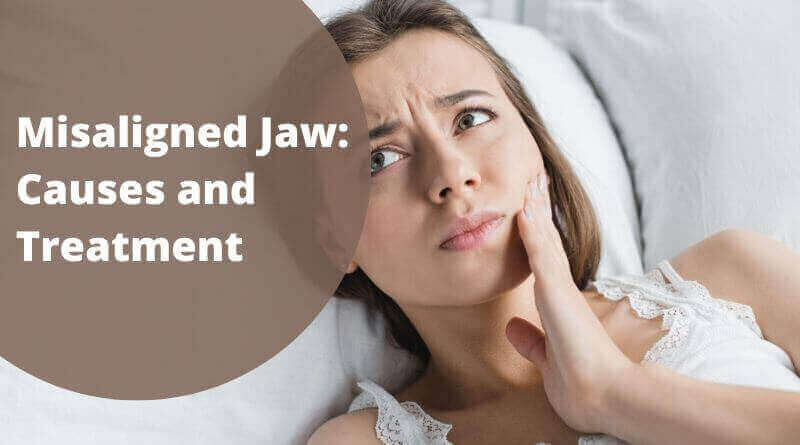Misaligned Jaw – Causes and Treatment
What is a proper jaw alignment? What happens if your jaws are not matching properly? Or if you are experiencing jaw pain and other problems? Cosmetic dentistry can be a good solution, and if you want to learn more, you can follow the link for additional information. Here, we will talk about correct teeth alignment, problems that a patient might experience if they have misaligned jaws, and ways to treat the condition.
Table of Contents
Proper Jaw Alignment
Having a proper jaw alignment can help you avoid many dental problems. Of course, everyone would like to have a beautiful smile, but it isn’t always the case. When we talk about jaw alignment, we refer to the way your upper and lower jaws align when you bite down.
If the teeth align perfectly with each other, there are no problems. This is what’s known as proper jaw alignment. Anything other than normal falls into the category of misalignments, and it is a condition you will need to address as soon as you spot it.
Types of Misaligned Jaws
There are three main types of misalignment you might notice, and they are based on the way upper and lower jaws fit together. If the lower jaw is moved to the back and the upper teeth fully cover the lower ones, it is called an overbite. In the opposite scenario, the lower jaw will stick out, and we call that an underbite. The third type is overjet, and it happens when teeth in the maxillae are at an angle and sticking out over the mandible.
Having an overbite to a degree is normal, and the main question is whether the difference between jaws is huge or not. You can easily notice when someone has a misaligned jaw since it will affect their physical appearance. In case a slight difference between the maxilla and mandible exists, it might not cause problems for the patient, and it all comes to a degree of misalignment.
Finally, jaw and teeth problems can be caused by trauma. If a person gets injured or breaks their jaw, it might not heal properly, causing one of the conditions we mentioned.
Read: How Long Do Veneers Last
Causes
There are several things that might lead to a misaligned jaw. The most important one is genetics. If your parents had problems with misalignment, there is a chance that you will have as well. As with other genetic traits, there is nothing you can do to prevent it. However, there are treatments and options which we will cover in a bit.
One thing that parents should avoid is letting their child use a pacifier too much during development. The same thing applies to thumb sucking. These actions can lead to a person having an overbite when they grow up, and baby teeth can often affect the condition as well. Naturally, pacifiers are good, but you shouldn’t let your child use them when they are older.
Any type of unnecessary contact with the mouth/teeth can cause problems. And it includes nail-biting for teenagers and adults as well. Other possible causes include mouth breathing, pushing the tongue against teeth, using a bottle for too long, etc. While the problem is mostly in genetics, these other factors can contribute to the condition, leading to a misaligned bite later on in life.
Read: Risks of Pericoronitis
Potential Problems
The first and most obvious problem is physical appearance. Having a misaligned or crooked jaw will not look beautiful. And people with this condition might experience problems with self-esteem and confidence. But even if you don’t care about having an uneven jaw, it can still cause other problems.
It is possible for a person to experience pain and have difficulties trying to eat. Furthermore, it can affect their ability to speak, and the condition can lead to TMD or temporomandibular joint disorder. Furthermore, these types of misalignment can lead to other dental problems, and the patient might even experience sleep apnea. All of these problems are a sign that you will need to address the condition as soon as possible.
Of course, if it is only a slight misalignment, there might not be a need for treatment. Your dentist will be able to provide more information about the subject, and they will be able to propose a potential treatment.
Is There a Solution?
Yes. You can cure any type of jaw misalignment, but the type of treatment will be based on the severity of the condition. Smaller misalignments can be corrected using Invisalign clear aligners. These are easy to use, they are made for your jaw, and they are a lot cheaper than traditional braces. The only thing you need to do is find an Invisalign dentist, and they will be able to do all the work. However, Invisalign braces are not miraculous. They can’t solve severe misalignments, and you might be forced to wear traditional metal braces.
In cases where the condition is so severe that even braces can’t help, the only remaining option is jaw surgery. For underbites, the surgeon will remove a small portion of the lower jaw, and it will allow them to move it back, correcting the jaw in the process. It might seem scary, but the procedure is quite safe and simple. As for overbites, the lower jaw will require alignment, and the surgeon will extend it to perfectly match the upper jaw.
What to Do?
If we are talking about genetic conditions, there is nothing you can do to prevent them. However, you can reduce the risks by eliminating some of the causes we mentioned. As for adults who already have a problem with misalignment, the simplest option is to visit your dentist and discuss your options.
There are numerous orthodontic treatments that will help solve the situation. It will improve your overall oral health and reduce the chances of developing gum disease and other dental problems. They will also be able to tell you whether the Invisalign will work or if you should seek other solutions.
So, before you start worrying about methods and treatments, talk to your dentist to get all the necessary information you will need. We recommend you address the problem as soon as you spot it, and it will make the entire situation a lot simpler.




